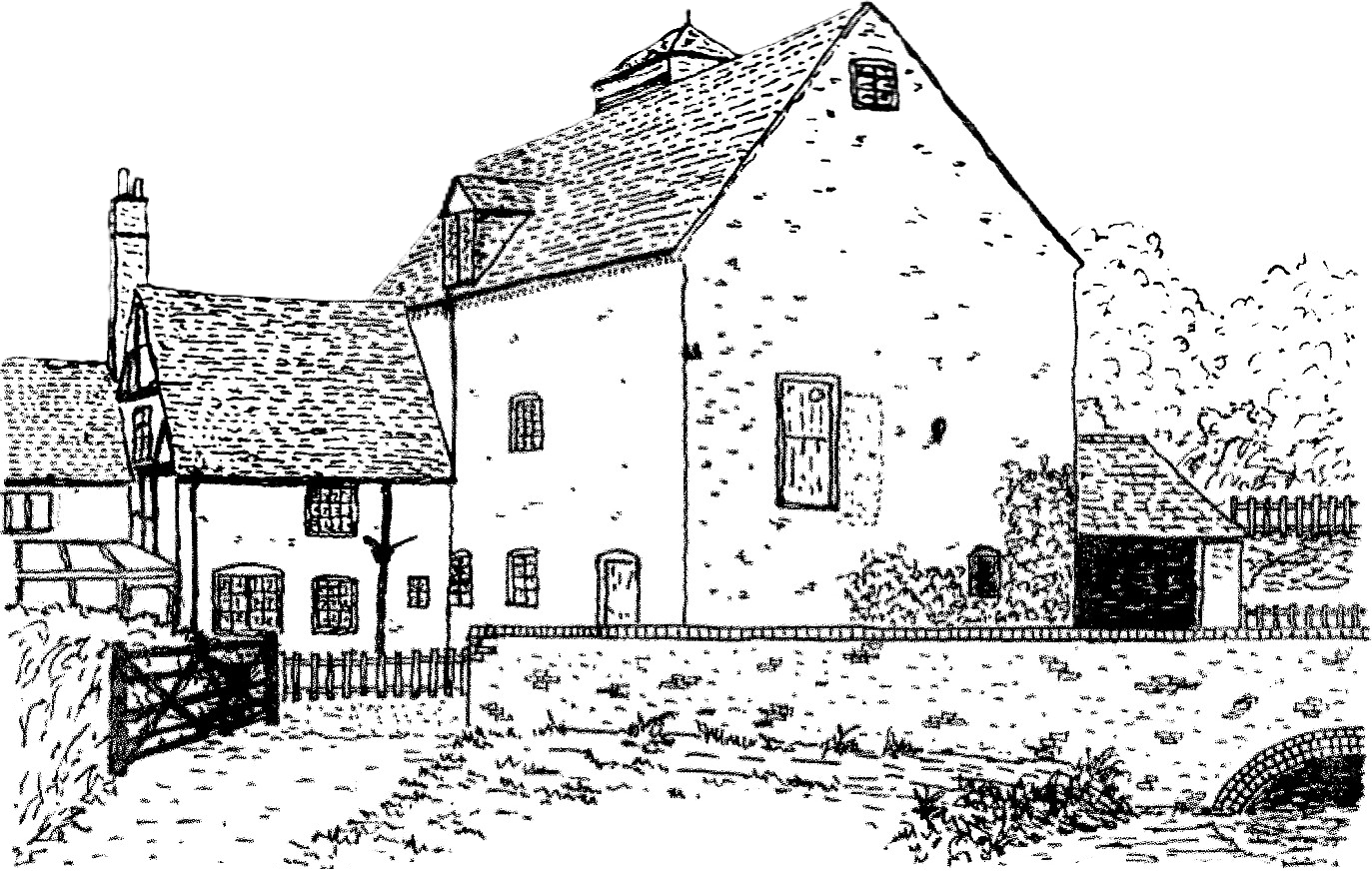The Twamley family at New Hall Mill

In 1709 new tenants came into possession of New Hall Mill - John Holloway and Robert Hicks, both of whom were bakers from Birmingham. Although Holloway and Hicks were the leaseholders, they employed a miller to operate the mill, and they were able to offer a newly rebuilt mill cottage as an incentive.
Thomas Twamley
It is not 100% certain who Holloway and Hicks employed as their first miller, but it was probably Thomas Twamley - indeed, Thomas may have already been working at the Mill when Holloway and Hicks took over. In 1715, when the freeholder, George Sacheverell, made his will, Thomas Twamley was named as the tenant of the Mill and also of New Shipton Farm. From this point onwards, senior Twamley millers tended to live at New Shipton, while the junior millers, often the miller's son, lived in the mill cottage, learning their trade and inheriting the New Shipton lease when their father retired or passed on.
William Twamley (1) 1700 - 1752
The next Twamley miller was William Twamley. There were four William Twamleys at the mill, so we will label them (1-4) for ease of understanding!
In the absence of a local baptismal record, a theory has gained traction on Ancestry that William Twamley (1) was born in Weston under Lizard, but this does not ring true - it is far more likely that he was Thomas Twamley's son. William married Elizabeth Smallwood in 1728. I have identified three children of this couple: Sarah Twamley who died in infancy in 1735, Zachariah Twamley 1736-1791, William Twamley 1739-1788.
There may have been another child, Samuel Twamley. In 1778, a Samuel Twamley was a mealman in Bromsgrove (he is mentioned in an advert). He may have been the tenant or leaseholder of the mill in nearby Stoke Prior.
William Twamley (2) 1739 - 1788
In 1752, William Twamley (1) died aged 52 in Sutton Coldfield. His son, William Twamley (2), probably took over immediately. He had married Mary Langley on 11 Jun 1762 at Maxstoke, Warwickshire, and they had a growing family. I have identified five sons: William Twamley (3) (1763–1825), Edward Twamley (1765), Samuel Twamley (1770–1832), Zachariah Twamley (1772–1856), and John Twamley (1775) who became a farmer at Thimble End.
In 1770 an advert for the sale of New Shipton House refers to William Twamley of New Hall Mills as a contact. (This plural is used consistently until William's death in 1788).
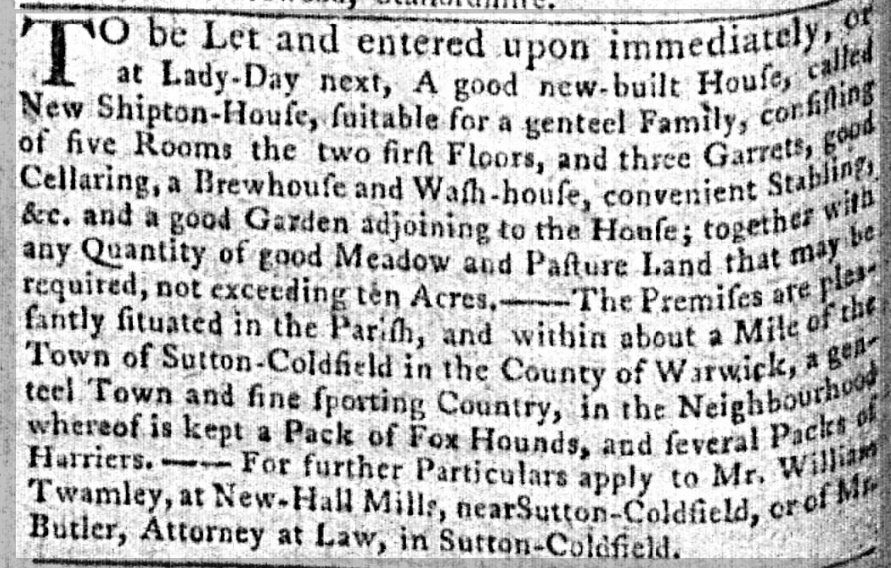
In June 1779 William Twamley (2) was again listed at New Hall Mills in connection with the sale of the Knowle estate in Rowley Regis. This lends weight to the idea that William had a brother called Samuel, as a Samuel Twamley was married to Mary Turton in Rowley Regis in 1760.
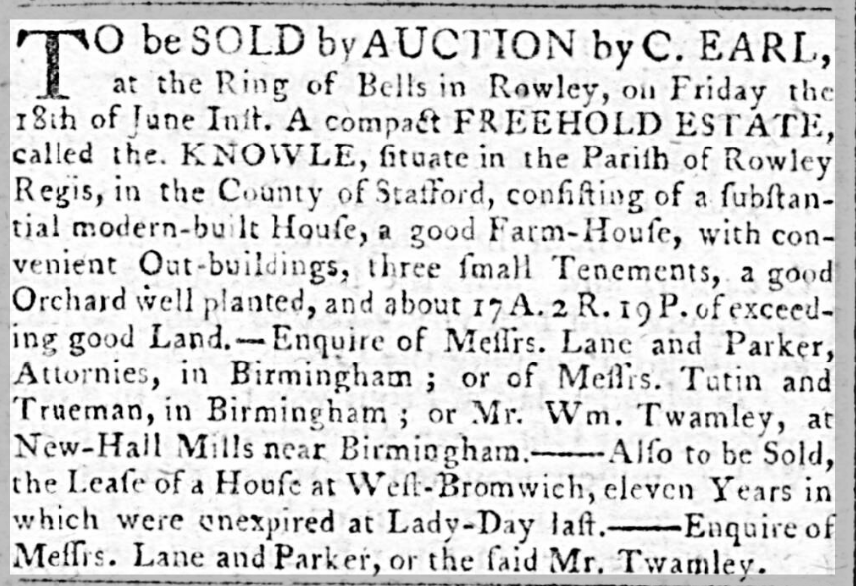
In August 1780, the Rose and Crown inn in Moor Street, central Birmingham, was put up for sale. William Twamley (2) was once again one of the contacts, and was referred to as a miller of New Shipton near Sutton Coldfield.
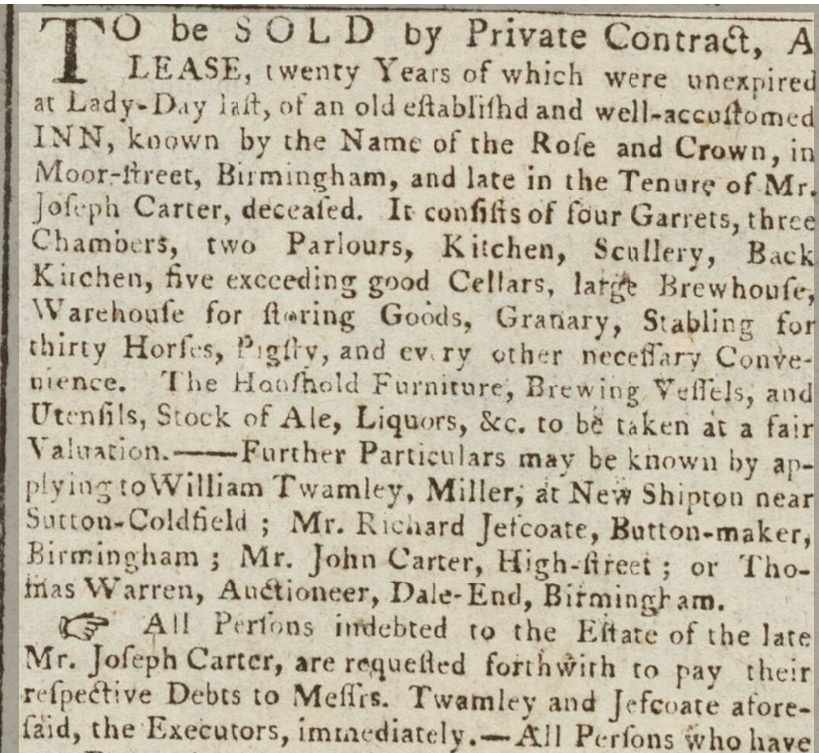
In February 1784, William Twamley (2) was party to a scheme in which various millers and bakers agreed to supply the 'large loaves' favoured by the poor, on moderate terms. The advert below indicates that they were appealing for public funds to support this scheme.
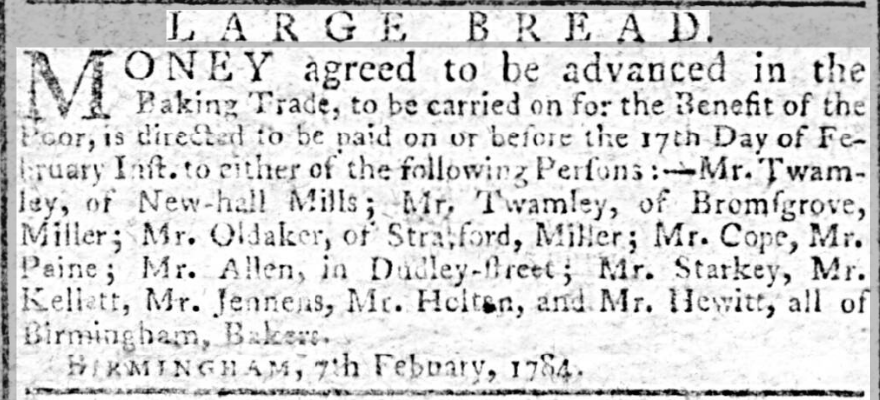
A warehouse for the sale of bread under this scheme was opened in Snowhill, Birmingham, on 4th March 1784.

That same month, March 1784, William (2)'s mother Elizabeth Twamley died.

William Twamley (2) died at New Hall Mill on 7th April 1788, aged 49.

William Twamley (3) 1763 - 1825
By now the sons of William Twamley (2) and his wife Mary were well established in the milling and baking industry. I have identified five sons: William Twamley (3) (1763-1825), Edward (1765–1824), Samuel (1770-1832), Zachariah (1772–1856), and John (1776–1844).
During the 1790s William Twamley (3), as tenant of the mill, built the present mill building with its upper storeys, to replace the previous single-storey building.
In 1791, Williams's uncle Zachariah Twamley died. He was a devout man - at the age of 22 he subscribed to a publication called "Thoughts Moral and Divine". He became a miller at nearby Castle Bromwich mill. William was one of the executors of his will.
In a 1795 survey taken just after Charles Chadwick had just inherited the New Hall estate, William Twamley (3) was paying an annual rent of £35 for the Mill, and an additional £43. 4s. 2d. rent for thirty acres of meadow. The surveyor noted that the rent was discounted in consideration of William “having been at great expense in repairs.”
Unfortunately, Charles Chadwick had been making improvements of his own. He increased William's rent to £84 when the leases on the New Hall properties were renewed from March 25th 1795.
William Twamley (3) had fingers in many pies, with farming, milling, baking, and estate management as the common denominators. In 1800 he was issued with a game certificate. Also in 1800, he was one of two Trustees dealing with the estate and creditors of Timothy Hill, a baker in West Bromwich. In June 1802 he was one of the two men dealing with the estate of John Palmer, gentleman of Maxstoke. In 1802 an auction was held to dispose of some 'Capital Worsted Machinery' in Kidderminster, belonging to William Twamley, Thomas Darlaston, Edward Twamley, Samuel Twamley, and Zachariah Twamley.
The Twamley siblings were all of marriageable age. Aris's Birmingham Gazette reported the marriage of William's brother Samuel Twamley, miller of Kidderminster, to Miss Powell of Wolverley, in November 1802. In November 1805, William Twamley (3) married Elizabeth Farmer of Dosthill, in Tamworth. In July 1810, Miss Twamley of Castle Bromwich, probably a daughter of Zachariah, who married John Blakesley of Hinckley, a banker.
On 24th November 1806, William's wife Elizabeth was delivered of twin children, William and Maria. If they had other children, they did not survive. Elizabeth died at New Shipton Farm at the young age of 39, in April 1815.
In 1824 William Twamley (3) still lived at New Shipton Farm and held the lease of the Mill. He referred to himself as a mealman. He employed a master miller, William Hingley, who lived in the mill cottage.
In February 1825, just before the next lease renewal, William Twamley (3) died. At that time he was still the leaseholder of New Hall Mill and Duddeston Corn Mill in Birmingham.

The late Roger Lea wrote this story in the Sutton Observer about William (3): Three yeomen of Sutton, William Twamley, Richard Kesterton and Isaac Terry were accustomed to put horses into Sutton Park to graze, paying the Warden and Society tenpence a quarter. In 1787 the Warden started to charge 18d. a quarter, and our three yeomen, together with Joseph Grange, a cordwainer, objected to this and appealed to the courts, saying that the 10d. charge was enshrined in the town’s Charter of 1528 and could not be altered. Twamley was the tenant of New Shipton Farm and of New Hall Mill, and, together with his sons, had improved both properties by extending or rebuilding them. No doubt the spirit of improvement and revolution which was in the air (as Wordsworth put it - “Bliss was it in that dawn to be alive /But to be young was very heaven”) encouraged him to try to liven up the somnolent Warden and Society. William took an active interest in the progress (or lack of it) of the Chancery case - his son Zachariah says Sir John Scott told his father “No man could have taken a more honorable matter in hand”. The case did not ruin him - he took on the lease of Duddeston Mill at £180 per annum in 1815, describing himself as “William Twamley of New Hall Mill, mealman”. In 1817 the Warden and Society had to elect six new members to replace six who had died or left the district; it was for the remaining eighteen men to choose the new members, and William was one of the successful candidates. He did not see himself as part of the Establishment, however, as can be seen from the voting on a proposal to help the cottagers - for: William Twamley; against: the other 16 members present. The Chancery case was finally resolved in 1824, with the Warden and Society agreeing to a scheme for better governance of the town, but William Twamley died early in 1825, before the new scheme was put into effect.
I have found no evidence of the son Zachariah mentioned in the above account, and wonder whether these references should be to William's brother, Zachariah.
William's (3) will states that he had lately taken on a fifty year lease for Duddeston Mill. He left all his milling interests, tenancies, and machinery to his son William (4) and a specific bequest of £1,500 to his daughter Maria. After settlement of these bequests, the remaining value of his personal estate including his farming interests and stock was to be divided equally between William and Maria. The provision for Maria was remarkable for its time. She later married William Sirdefield, an innkeeper, and moved away from Sutton Coldfield to Liverpool.
William Twamley (4) 1806 - 1855
In 1825 William gave up the leases for both mills, New Hall and Duddeston. The new lease for New Hall Mill, dated March 25th 1825, was granted to Benjamin Brentnall the younger, a miller from Borrowash in Derbyshire. Brentnall also owned a baker's shop and a flour warehouse. The New Hall Mill lease included fourteen acres of meadow, and a stone house in Wylde Green Road, known as the Ford-Keeper’s Cottage. Brentnall's rent was £110 per annum, together with some sweeteners for his landlord: a couple of fat pullets a year, a wagon and team for one day a year, the care of a dog for Chadwick’s use, and the cost of all repairs. Chadwick reserved the right to hawk, fish and fowl on the land, and the use of water from the leat to flood the water meadows in the winter.
It seems that Brentnall had a sub-tenant of some kind at New Hall Mill, William Parkinson. At present all we know of him comes from some references in the newspaper, Aris's Birmingham Gazette. It appears that he became bankrupt.
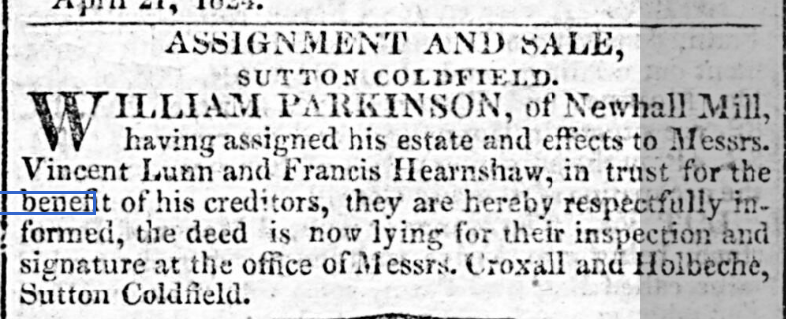

Brentnall did not do well. He was declared Bankrupt, and in 1829 his property was sold to meet his debts. At this time William was still living at New Shipton Farm.
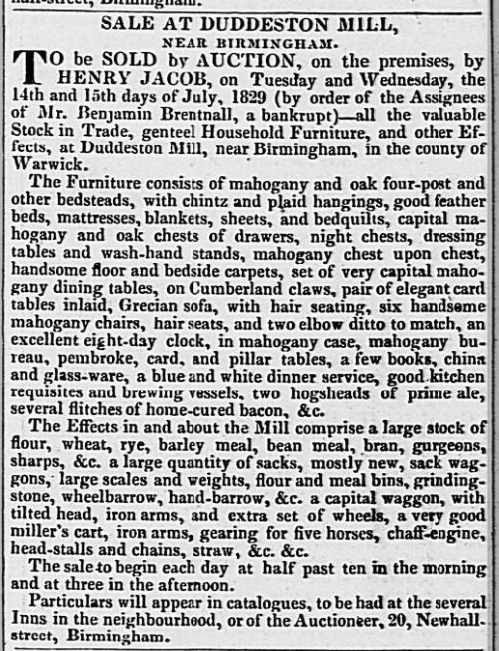
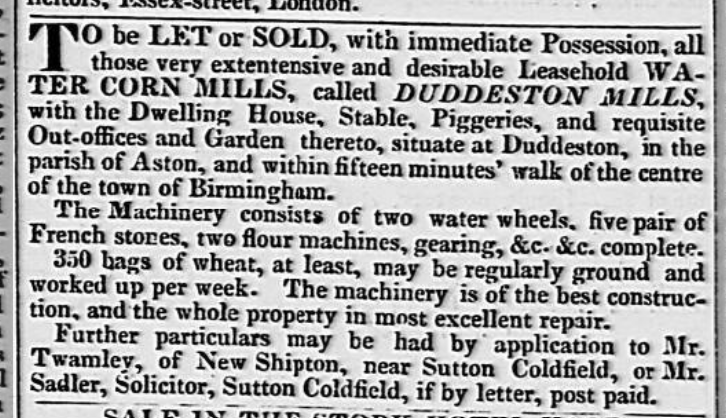
Brentnall would not be released from the restrictions and obligations of his bankruptcy until 1841.
William Twamley (4) took back occupation of New Hall Mill, albeit temporarily - it is possible that he was one of Brentnall's creditors. Curiously, the advert below shows William Taylor, a carpenter, doing the viewings at the Mill, rather than William Twamley, when the lease was advertised in 1832.
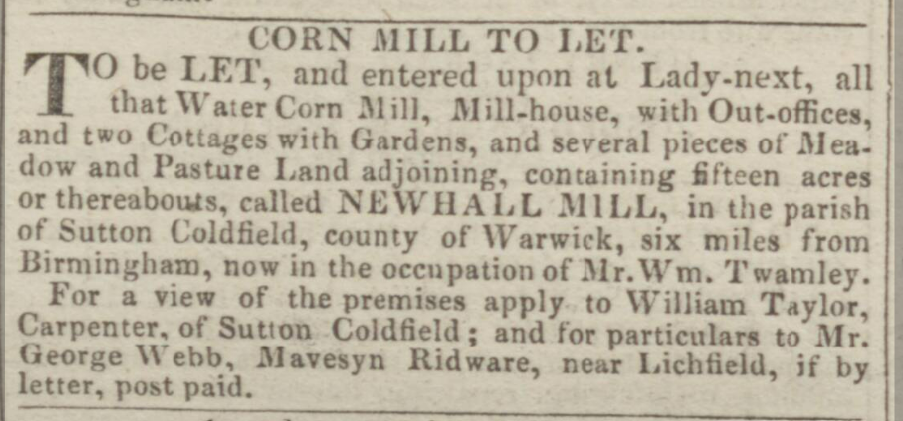
In June 1834 William began the disposal of another watermill, in Stoke Prior, near Bromsgrove. This was variously advertised for lease or sale, from June 1834 to September 1835.
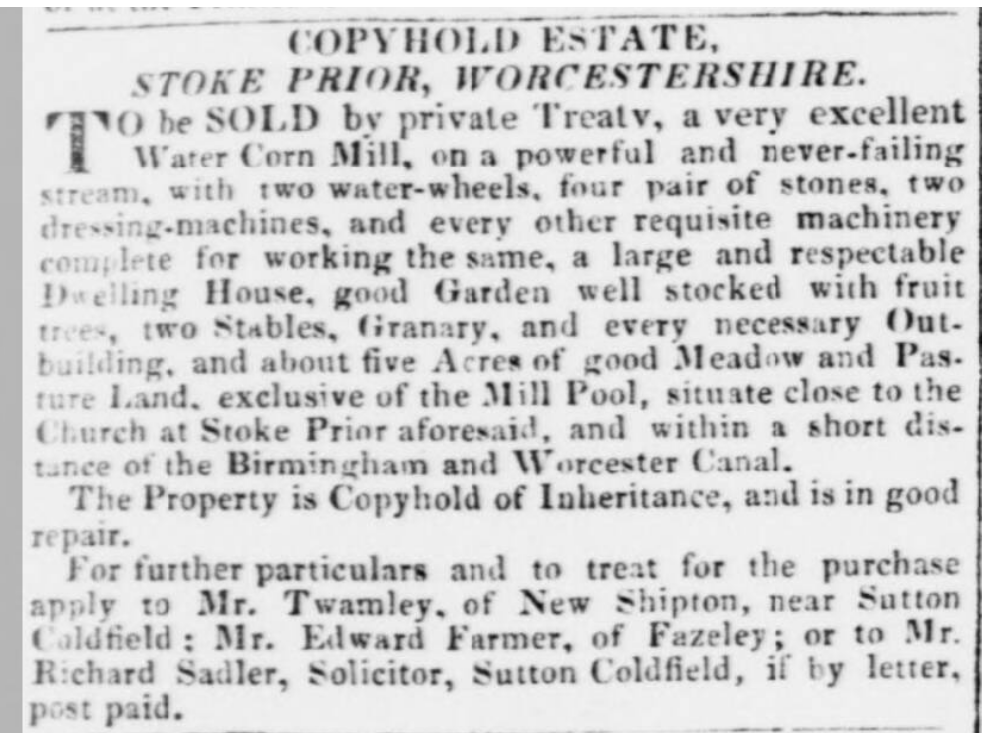
In March 1835 William Twamley was still farming at New Shipton, but in March and April 1835, he advertised that he was leaving the farm. Trustees were involved in the sale, so I surmise that he was in financial difficulties. This was either a bankruptcy, or William voluntarily created a trust to avoid bankruptcy.
The Mill is not mentioned in the advert below, being the subject of a separate lease, already transferred to the Duttons.
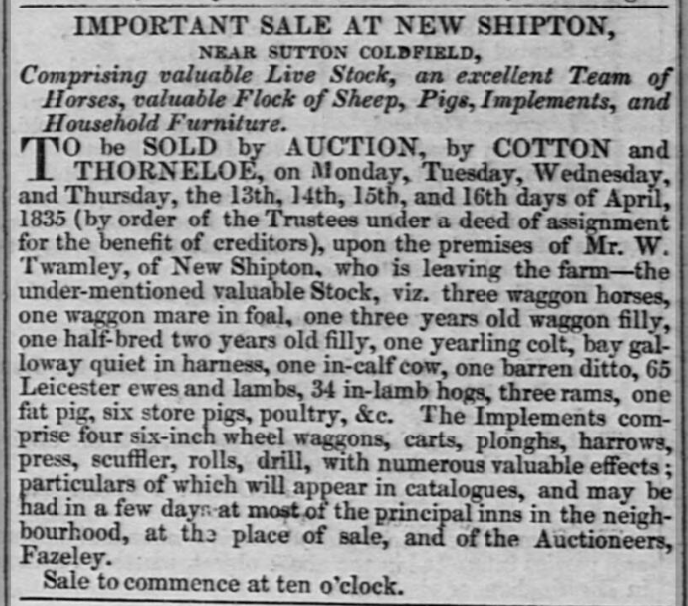
The above was the last advert for any of William's business interests. A buyer must have been forthcoming, as in May 1837 a final meeting of creditors was called.
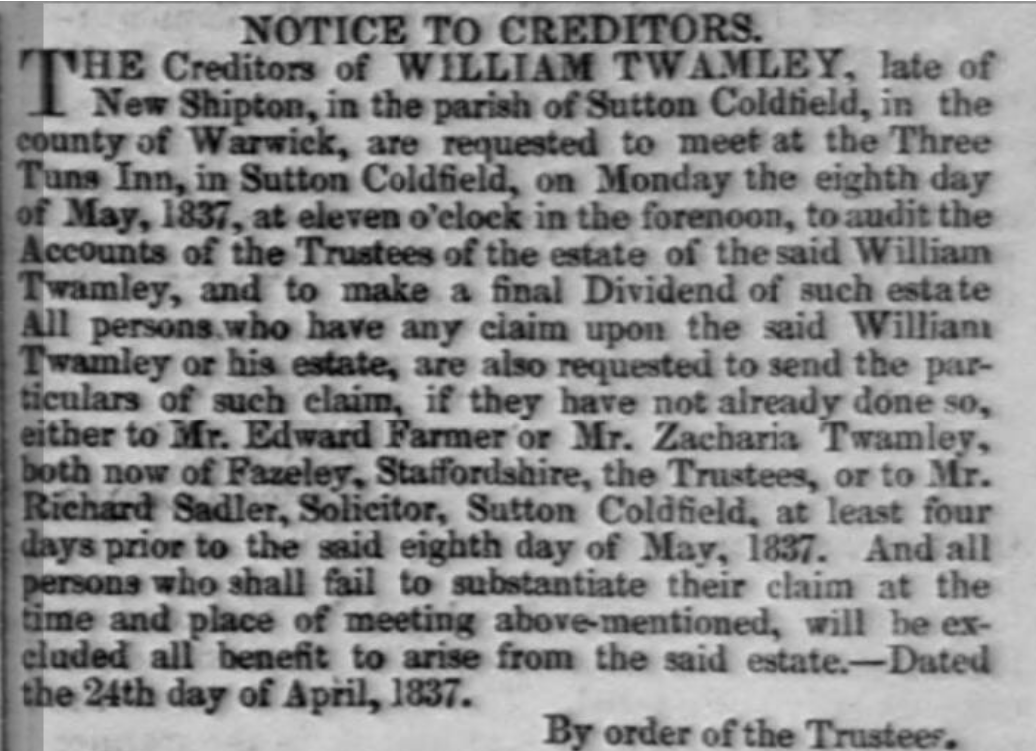
This meeting marked the end of the Twamley family's involvement in New Hall Mill and New Shipton Farm. New tenants, Joseph Todd and his family, took over New Shipton Farm.
William Twamley seems to disappear from records after 1837 - so far I have not found him in the 1841 and 1851 censuses. He is NOT the son of Thomas who married Ann Hines in Birmingham and later lived in Shuttington. Could he have gone abroad? There is a William Twamley who went to New York around this time. However, he was buried in Sutton Coldfield, in 1855, at the age of 48.
Zachariah Twamley 1772 - 1856
Zachariah Twamley was the son of William Twamley (2) and the brother of William Twamley (3). He was born at New Shipton Farm in 1772. Inevitably, Zachariah followed in the family business, running Castle Bromwich Mill on the river Tame for many years. On his retirement he returned to Sutton Coldfield, and in 1855, at the age of 82 he wrote an unpublished history of the town, which we believe is held in Sutton Reference Library. He briefly touches on New Hall Mill, saying, "the family of the Twamleys were occupiers of the mill for a great number of years." Zachariah died the following year, in 1856.
The Corn Inspector
In July 1834, Mr Henry Meredith was appointed Corn Inspector for Birmingham, on behalf of the widow and daughter of the late Inspector, Thomas Twamley, deceased. I have not yet identified which Thomas Twamleys held this position, but the date does not directly match the details of any of the New Hall Mill Twamleys.
N.B.
Please note that this article is still under development, with corrections and additions to come, but there is sufficient here to justify publishing it.
Sheridan Parsons
